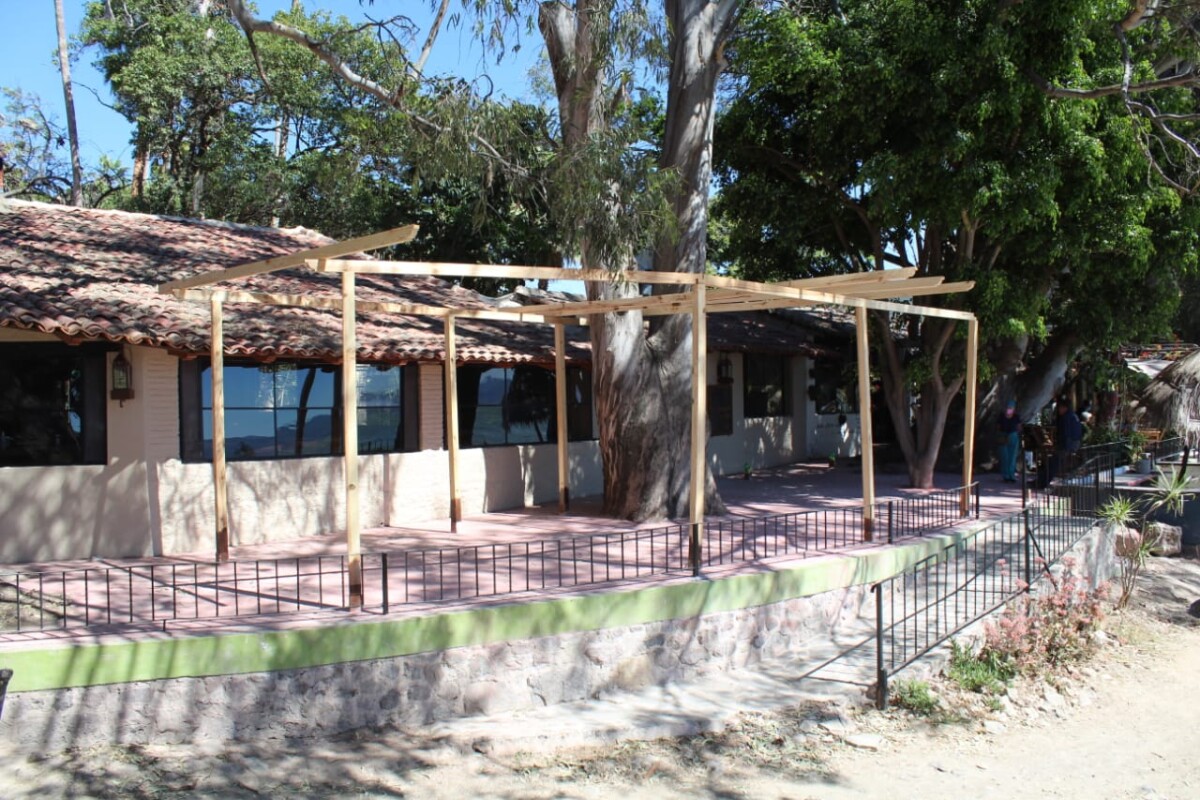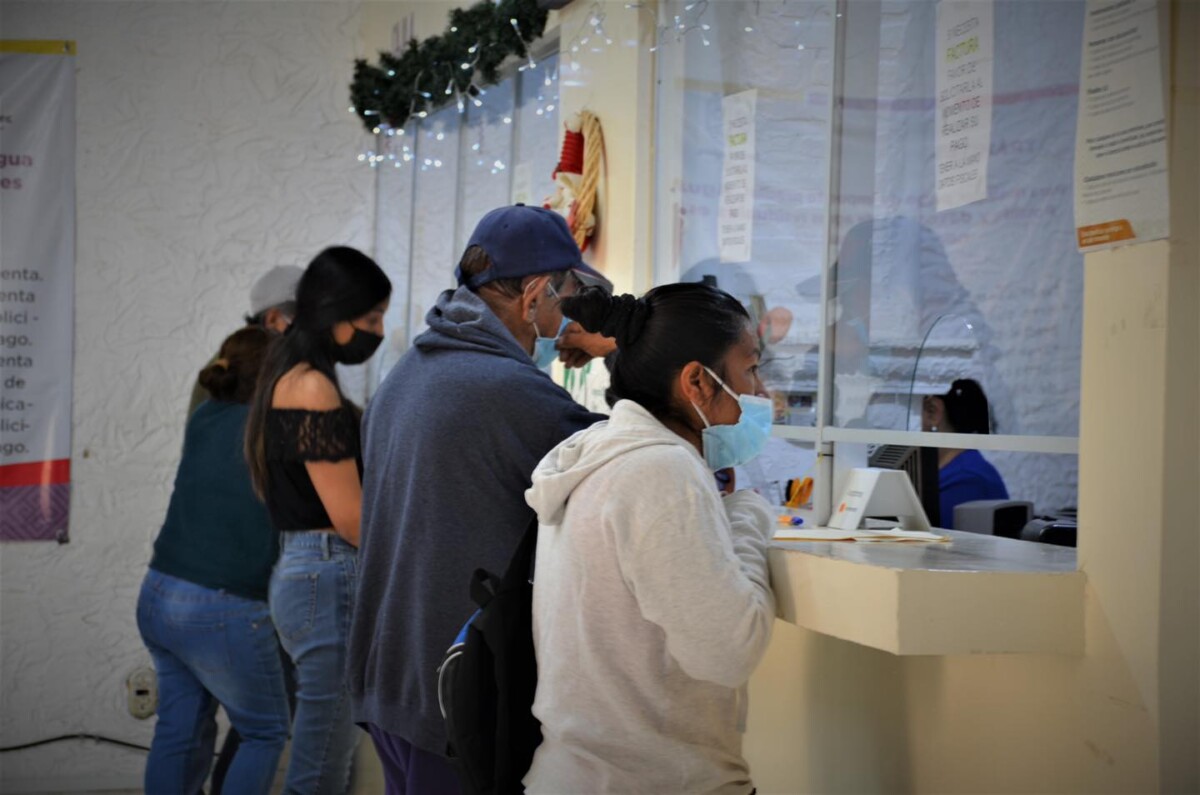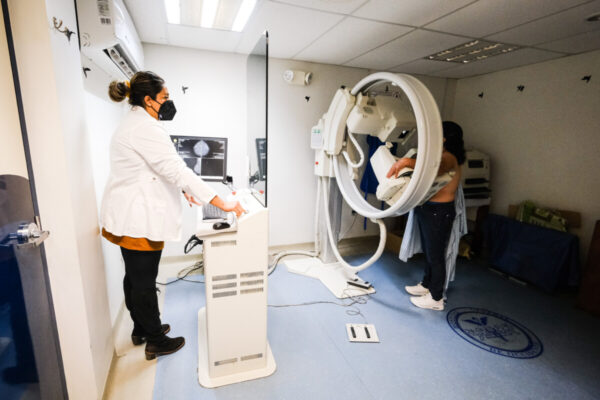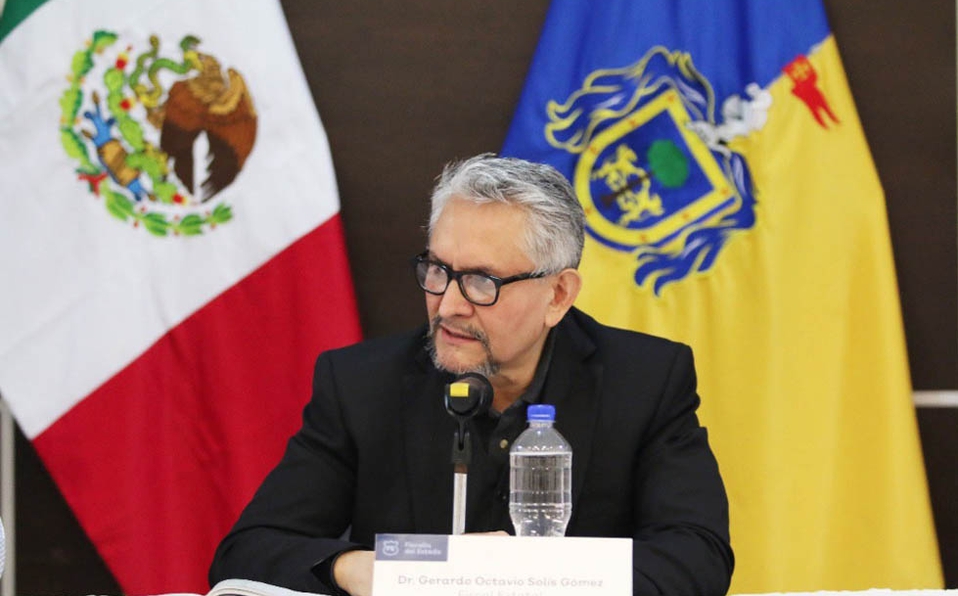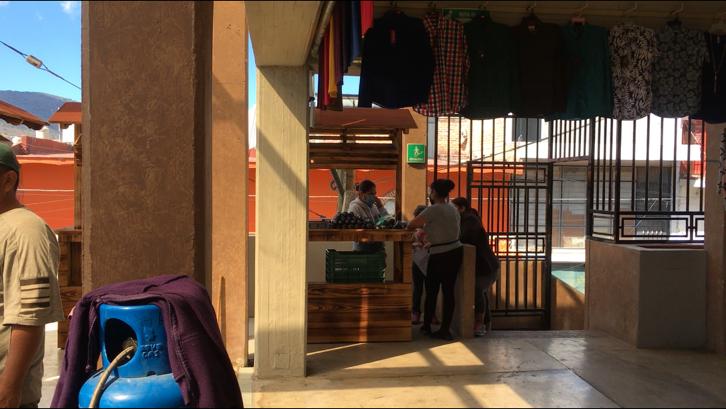comunicado
Citizen complaint prevents encroachment into Lake Chapala
The structure that was intended to be a pérgola for the restaurant.
Sofía Medeles (Ajijic, Jal). – On February 1 Ajijic residents reported an illegal gazebo that the Bonanza restaurant had just placed on public property on the Lakeshore, generating a quick response by the authorities who ordered it removed.
The complaint was generated by a member of the group «Pueblos Unidos de la Ribera» and the activist of Ajijic, Sinuhé León, who publicized the placement of a wooden frame in front of the dock, a site known by the Ajijitecos as «la vieja posada» (the old inn) through social networks.
Sinuhé León also contacted the Ajijic town office manager, Maximiliano Macías Arceo, who quickly contacted the manager of the business, as well as the inspectors of the Regulations Department of Chapala, who resolved the complaint that same day, ordering the removal of the pérgola.
Inspectors Julio César Sotelo Beltrán, Irving Cortés and Sergio Real arrived in the area and asked the restaurant administrators to immediately remove the wooden structure as well as to make modifications to the floor to leave some boxes for the roots of each tree.
«Permission was not requested to place (the structure) and, in this case, the natural flora also intervened because of the trees. Today it has to be removed», said Julio César, adding that these types of irregularities are dealt with in coordination with other agencies such as Padrón y Licencias, Ecología, Obras Públicas and Desarrollo Urbano.
For her part, the owner of the restaurant, Laura Jiménez de Beltrán, said she did not intend to gaining land in the Federal zone, so removing the gazebo did not bother or affect them and that, because she understood the space in front of her restaurant, as well as those on one side, are for pedestrian passage, since it is considered a sidewalk.
«Our intention was not bad; on the contrary, with this business we stimulate local commerce, jobs for the residents and attracting tourists. We want to tell the people that we are not here to steal and that this part of this restaurant and the ones nearby, is still a sidewalk, and if we get permits to put tables outside, everything will be with licenses and the passage will never be closed», commented the restaurateur.
Likewise, Sotelo Beltrán, said that her work in the Federal spaces is done in conjunction with the municipal legal department, carrying out inspections and taking time to act in conjunction with the agencies that are responsible, in this case, the National Water Commission (CONAGUA).
The Acting Delegado, Maximiliano Macías, commented that it was a citizen’s complaint, which he appreciated, since he said that there are times when people do not realize the things that happen. He added that the manager of the business claimed to have no knowledge that the license was necessary, but did not put up any resistance when he received the orders from the regulations.
Translated Patrick O’Heffernan
Arrest in San Nicolas for domestic violence
Truck of the state prosecutor’s office of the state of Jalisco. Illustrative picture
Juan Gabriel «N» was arrested in San Nicolás de Ibarra on charges of domestic violence and aggravated injury. The arrest was made by members of the Jalisco District Attorney’s Office.
The man was captured when he was on Francisco I. Madero Street and Obregón Street in the town of San Nicolás de Ibarra, in Chapala. The arrest is related to events that were reported to the Prosecutor’s Office in 2021.
Translated by Kerry Watson
Parents complain about the Aurelia Flores kindergarten because of facilities in poor condition
The provisional entrance to the kindergarten is through the Cruz Azul sports field.
Sofía Medeles – The construction works at the Auditorium of La Ribera, in Ajijic, unleashed complaints from parents of the students of the Aurelia Flores kindergarten, located next to the auditorium, due to the blockage of the entrance and the deplorable state of its infrastructure.
The first of the problems mentioned was the lack of an entrance, since the beginning of the school year in August 2021. When returning to classes, after the pandemic, parents discovered that the main entrance, located next to the Auditorio de la Ribera, was closed due to construction, so the provisional entrance is through the Cruz Azul sports field.
«There are many problems with the entrance. To begin with, the people from the field ask us not to cross, and to go around the field, so that the grass is not damaged. This causes, for example, that in times of rain, our path is flooded, and both the children and the parents get wet. For us there is no problem, we go home and change, but the children get wet feet and get sick,» mentioned one of the mothers interviewed.
In addition, the mothers denounced another group of shortcomings of the kindergarten, among them walls with damages that present a risk of falling; several bathrooms out of service – they reported that there are only two working; awnings in bad condition; and the lack of a custodian.
«Since we started the (school) cycle, there hasn’t been a custodian, because the previous one resigned, so among the parents we agreed to pay someone to do the cleaning. But we couldn’t arrange it. They say that one is going to come in, but this shows that neither the State Government nor the City Hall are looking at the kindergarten’s deficiencies,” added another of the mothers.
For her part, the president of the parents’ committee, Lucía Padilla, assured that the school’s director has already been in charge of sending an endless number of letters to ask for resources and personnel, but the authorities limit themselves to answering in a positive manner and the petitions never arrive.
«We are going back to school with many deficiencies, and it was two years in which the kindergarten was abandoned. Not only this one, but several schools are in bad condition. The Secretary of Education has neglected the schools. Not only the parents, but also the director is desperate for an answer, and above all, actions,» stated Lucía.
Regarding the entrance, Lucía commented that, although the provisional entrance is annoying, they prefer that to the children entering through the main entrance, since due to the work being done – which the workers themselves told them has no end date – an accident could occur that could harm the students.
Finally, Lucia commented that there is no way to obtain resources, since the pandemic situation prevents them from holding events. «How can there be a work of considerable investment, next to a kindergarten that is in poor condition, and that school not receive attention, even if it is just a little bit?” she questioned. “The community should know that we are going to try to improve the school, but it cannot be done without everyone’s help.”
Translated by Sandy Britton
Tax collection in Jocotepec increased 30 percent over last year
Jocotepec increased its tax liability by 30 percent in January of this 2022. Photo: Courtesy.
Héctor Ruiz Mejía.- Jocotepec residents displayed good tax participation. In January alone, they paid 9,453,761 pesos in property and water taxes.
Of the amount collected, 5,606,790 pesos correspond to property tax payments and 3,846,971 pesos to potable water services, stated Marcela Góngora Jiménez, Jocotepec’s Treasury Director.
The official highlighted that the amount of taxes collected during the first month represented an increase of approximately 30 percent in property tax payments over last year, as well as 36 percent increase in water service payments, which is why she was pleased with the tax response this year in contrast to previous years.
This, Góngora Jiménez explained, may have been due to the implementation of new tax payment options such as the recently implemented internet payment platform, which allowed taxpayers to meet their obligations on time through debit or credit cards.
«I believe that expanding the options for receiving payments allowed the citizenry to respond,» affirmed the Treasury director.
According to municipal president José Miguel Gómez López, the water collection issue had not been regularized due to the supply failures that had persisted since he took office in his last administration.
Also, the implementation of a new ChatBot that allowed users to make their payments through the WhatsApp application, have been part of the changes that the municipality optimized in collection matters that, according to Gómez López, was previously chaotic.
Thus, municipal authorities celebrated the collection situation for this year which was surprising, given the general five percent increase in taxes for the population, approved by the Jalisco Congress.
Finally, the official urged the community to be aware of their respective tax responsibilities, since the proper functioning of social programs and services depends on the payment of taxes.
Translated by Sydney Metrick
Estilo de vida saludable y revisión médica, claves para prevenir y detectar el cáncer a tiempo
Las autoridades de salud recomendaron realizar mínimo un chequeo general al año para prevenir esta enfermedad.
Redacción.- Llevar un estilo de vida saludable y acudir a realizarse una revisión médica periódica son acciones que permiten prevenir o detectar a tiempo el desarrollo de un cáncer y con ello tratarlo en etapa temprana y aumentar las posibilidades de curación.
El cáncer es un problema de salud que está entre las primeras cuatro causas por atención y por muerte en ambos sexos (Inegi, 2021), y una gran cantidad de pacientes con tumores malignos suelen estar en edades económicamente activas. En México los tipos de cáncer más frecuentes son: mama, próstata, cuello del útero, tráquea, bronquios, pulmón y colon.
“El cáncer es un desequilibrio celular que tiene su origen a nivel molecular interno en donde las células de todo el cuerpo están en constante replicación, están en constante revisión en donde existen algunos factores principalmente genéticos y ambientales, propios de cada persona, que cuando tenemos esta división celular hay algunas que nacen con alguna alteración y no son detectadas por el sistema de respuesta inmediato de nuestro cuerpo por alguna situación y entonces forman tumores”, informó Víctor Manuel Correa Santillán, subdirector médico del Instituto Jalisciense de Cancerología (IJC).
El especialista señaló que el cáncer no es atribuible a una sola causa, sino que es multifactorial: tanto consecuencia de alteraciones genéticas que se pueden dar desde el nacimiento como otras muy diversas que se van presentando a lo largo de la vida e incluyen factores de tipo ambiental, nutricional y virales.
Por ello, para reducir el riesgo de desarrollar cáncer es importante “tener un estilo de vida saludable cómo llevar una alimentación balanceada y lo más natural posible, consumir frutas y verduras, realizar ejercicio físico, disminuir los factores de estrés, dormir bien, consumir la menor cantidad de azúcares refinadas, control adecuado del peso, uso de protectores y filtros solares”, indicó.
Además, eliminar el consumo de tabaco y evitar el abuso en la ingesta de alcohol.
Correa Santillán recalcó que el cáncer es curable si es detectado a tiempo, por lo que subrayó la importancia de acudir al médico por lo menos una vez al año para realizarse un chequeo general y con ello poder detectar alguna alteración en su cuerpo.
“En el IJC tenemos a disposición de toda la población, métodos y diagnósticos muy avanzados de alta tecnología como es la mamografía, el ultrasonido complementario -que deben realizarse todas las mujeres a partir de los 39 años, o antes si presentan alguna alteración o cuentan con algún familiar con cáncer-, y en el caso de los hombres a partir de los 40 años revisarse la próstata”, precisó.
El IJC oferta los servicios de oncología quirúrgica, médica y radioterapia para personas mayores de 18 años. Cuenta con clínica para tumores de mama, cérvix, útero, ovarios, clínica de displasias, clínica de atención a cáncer de próstata, además de acompañamiento psicológico y nutricional para los pacientes y sus familiares cercanos.
En 2021, el IJC atendió 3 mil 282 consultas por primera vez.
Signos y síntomas de un posible tumor
- Cambios en el tamaño, en la forma o textura de la piel
- Un engrosamiento o abultamiento en la piel o debajo de ella
- Ronquera o tos que no se quita
- Cambios en los hábitos del intestino
- Dificultad o dolor al orinar
- Dificultad para pasar alimentos
- Aumento de peso o adelgazamiento sin razón conocida
- Sudores nocturnos sin explicación
- Hemorragias o secreciones no acostumbradas
- Un lunar nuevo o un cambio en un lunar existente
- Una llaga que no sana
- Debilidad, fatiga o mucho cansancio
OPINIÓN: DE NORTE A SUR
La Reforma Energética impulsada por AMLO busca favorecer a las plantas estatales de generación eléctrica. Foto: cortesía.
Por: Abigail A. Correa Cisneros
El nuevo régimen que propone el Gobierno Federal en su Reforma Energética estaría impulsando el crecimiento del campo y garantizaría la seguridad alimentaria nacional. Así lo considera el subsecretario de Autosuficiencia Alimentaria de la Secretaría de Agricultura y Desarrollo Rural, Víctor Suárez Carrera.
Desde su punto de vista, la aprobación de esta iniciativa es crucial si se quiere eliminar las desigualdades entre el campo y la ciudad o entre regiones y tipos de productores del campo. El funcionario encabezó la conferencia 32 del ciclo Autosuficiencia Alimentaria e Innovación Tecnológica con Prácticas Sustentables, que organiza la Secretaría de Agricultura.
En la conferencia, cuyo tema fue “Reforma eléctrica y sus implicaciones en el medio rural”, Víctor Suárez consideró clave que se impulse la confiabilidad del sistema eléctrico nacional como un sistema de servicio público nacional, ya que la planeación y control quedaría a cargo de la Comisión Federal de Electricidad (CFE), y también la soberanía nacional en minerales estratégicos, “pues concibe que el litio y otros minerales serán bienes del dominio de la nación de manera inalienable e imprescriptible”.
El director general de la Comisión Federal de Electricidad, Manuel Bartlett Díaz, afirmó que la reforma eléctrica que impulsa el Ejecutivo federal no representa de ninguna manera una expropiación para aquellos que hoy desde conglomerados privados ofertan ya el 46 por ciento de la energía en el país.
“Ese 46 por ciento es negocio, representa un mercado más grande que el de toda Argentina y Venezuela. No hay expropiación. Se les invita a que participen en un sistema de competencia entre ellos y bajo control y regulación del gobierno mexicano; pueden crecer o invertir, pero bajo el control de gobierno, pues la electricidad en conjunto se convertirá en un sistema de interés público”, afirmó.
El gobierno ha destacado, con la finalidad de que se apruebe la reforma, que hay un saqueo a Nación, permitido y gestado desde el salinismo, cuando comenzaron a impulsar las sociedades de autoabasto y los generadores independientes, mismos que se fortalecieron con la reforma de 2013. De esta forma se indujo la privatización de actividades que eran exclusivas del Estado, es decir, la transmisión, distribución y entrega de la electricidad.
El gobierno actual busca poner fin a estos abusos, sostienen las autoridades, porque se siguen otorgando beneficios ilimitados al sector privado, con fórmulas de abasto de energía que han puesto en desventaja a la CFE, pues ésta no recibe de dichas figuras de inversión privada pago alguno por el uso de su infraestructura de transmisión –una infraestructura pagada por recurso público durante décadas– y además la Comisión debe solventar las intermitencias diarias en dicho abasto de privados, lo cual merma económicamente a la paraestatal.
De seguir así, la CFE está condenada a la extinción, aseguró su director general; y en manos privadas -fundamentalmente de empresas como Ibedrola, otras italianas, así como fondos de inversión internacionales cuya cara no es visible- lo que ocurrirá será que la inversión en energía se concentre en los espacios territoriales que resulten de interés de negocios, como grandes ciudades, y se abandone a las localidades rurales, generando una mayor desigualdad social en México y también una desigualdad entre los agentes del medio rural.
En cuanto a la explotación del litio, México cuenta con una riqueza de 1.7 millones de toneladas, y con ello ocupa el lugar número 10 entre los países líderes globales en este mineral, mismo que encabeza, junto con el grafito y el cobalto, la lista de los 17 minerales que el Banco Mundial cataloga estratégicos para la transición energética necesaria para afrontar el cambio climático.
Sin embargo, es un tema en el que hay que profundizar, pues la explotación de este mineral en otros países ha representado la aniquilación del ecosistema. Aunque el gobierno de Andrés Manuel López Obrador asegura que no se realizarán expropiaciones y que la misma reforma pondrá freno al saqueo minero histórico en las últimas tres décadas.
Argumentan que la extracción de litio favorecería las acciones contra el cambio climático, al ser un mineral utilizado en autos eléctricos. Se prevé que en 2028 la presencia de estos vehículos, catalogados como una mercancía fundamental para la transición energética, pasará a ser de entre 50 y 200 millones de autos y para 2040 alcanzarán hasta 900 millones.
De allí que el litio tienda a encarecerse agudamente y resulte estratégico para los 23 países del mundo que cuentan con esta riqueza mineral. Actualmente una tonelada de carbonato de litio se vende en China en 41 mil 60 dólares, cinco veces más que lo observado hace un año.
Pero la extracción es peligrosa. En algunas zonas de México donde ya se realiza se pieza que habrá litio hasta dos décadas, durante las que se podría contaminar mantos acuíferos y acabar con la flora y fauna del lugar.
Es importante considerar que se utilizarán enormes cantidades de agua, de la que México ya no puede destinar a estas actividades porque el líquido escasea. Otro punto para analizar es el impacto a la salud ambiental. El cuerpo humano tiene alrededor de 7 miligramos de litio y a partir de 15 ya es altamente tóxico, por lo que, si se llegan a contaminar los mantos acuíferos o los ríos, ese litio puede llegar a las comunidades que quedarían expuestas a envenenamiento.
DESDE EL CENTRO
La Red de Bancos de Alimentos de México (Red BAMX) destacó que el desperdicio de alimentos también afecta el uso de agua. Se estima que 34 por ciento de los alimentos que se producen en México se desechan y el volumen de agua utilizada en estos sería suficiente para abastecer a la población mexicana durante 2.4 años. Mientras en el país hay 28.6 millones de mexicanos que viven en inseguridad alimentaria. En México se desperdician 20.4 millones de toneladas que equivalen a 491 mil millones de pesos. En 2020 un estudio indica que de 79 alimentos de la canasta básica se pierden 23.7 millones de toneladas, lo cual representa 2 por ciento del PIB.… Este dos de febrero, día de la Candelaria, faltarán tamales en algunas casas y oficinas. Vendedores reportaron la baja venta por el aumento de materias como las hojas de maíz, la manteca, pollo, queso, mole, la mayoría de los productos que se utilizan para preparar este típico antojito mexicano. También la pandemia provocó que este año los pedidos fueran menos, al haber poca afluencia en oficinas.
Pide Estados Unidos no viajar a México por alto riesgo de contagio de COVID-19
En caso de viajes necesarios, la agencia de salud pidió a los ciudadanos acatar todas las medidas de seguridad. Foto: Stefani Reynolds/AFP.
Redacción.- Los Centros para el Control y la Prevención de Enfermedades de Estados Unidos (CDC, por sus siglas en inglés), emitieron este lunes una alerta de viaje para recomendar a sus ciudadanos no visitar México por la alta incidencia de COVID-19.
Luego de pasar más de seis meses en el nivel 3, una categoría de menor riesgo según los CDC, nuestro país escaló, junto con otros 11 destinos del mundo, al nivel 4 de riesgo “muy alto” o máximo.
En su aviso oficial, los centros pidieron a sus ciudadanos no realizar viajes a menos de que sean estrictamente necesarios, por lo que instó a seguir todas las recomendaciones sanitarias, incluso si se cuentan con el esquema de vacunación completo.
“Evite viajar a México, señaló la agencia de salud estadounidense en su alerta. De igual forma sugirió una “autocuarentena” de 5 días después de viajar a México.
Entre los añadidos al nivel máximo de riesgo también aparecen cinco países de Sudamérica: Brasil, Chile, Ecuador, Paraguay y la Guayana Francesa.
La actualización del riesgo de contagio se da en medio de la “ola ómicron” que está viviendo México, registrando cifras récord de casos confirmados y fallecimientos desde octubre.
Precisamente el último reporte de la Secretaría de Salud federal registró 4 millones 930 mil 69 contagios y 305 mil 893 defunciones, desde que inició la pandemia de coronavirus en el mundo.
Estos son los 12 lugares añadidos a la alerta de viaje:
- Anguila
- Brasil
- Chile
- Ecuador
- Guayana Francesa
- Kosovo
- México
- Moldavia
- Paraguay
- Filipinas
- San Vicente y las Granadinas
- Singapur
Renuncia Gerardo Octavio Solís Gómez a la Fiscalía de Jalisco
Solís Gómez informó su renuncia mediante redes sociales.
Redacción.- Mediante un mensaje en redes sociales, este martes, el Fiscal General de Jalisco, Gerardo Octavio Solís Gómez, anunció su renuncia de forma anticipada por motivos de salud.
Luego de 30 años dedicados “con pasión e intensidad a defender la seguridad de los jaliscienses”, Solís Gómez informó que dejará la dependencia para atender asuntos personales.
“Es lógico suponer que ese esfuerzo sostenido tenía que pasar algunas facturas al paso de los años. En mi caso no fui la excepción y debo informarles que después de trabajar en diversos períodos jornadas extenuantes todos los días de la semana, me veo precisado a tomar la decisión de dar por concluido mi encargo de manera anticipada, al frente de la Fiscalía Estatal, esto para atender algunos temas personales de salud, los cuales requieren también de un tiempo razonable para su solución”.
Gerardo Octavio explicó que ya le comunicó su decisión al Gobernador del Estado, Enrique Alfaro Ramírez, de quien recibió su apoyo y solidaridad, por lo que este mismo martes lo informará al Consejo Estatal de Seguridad.
“No son momentos de regatear horas de trabajo al tema de la seguridad pública y la procuración de justicia por lo que, en un ejercicio de honestidad intelectual y ética profesional, he decidido tomar esa decisión, la cual ya he comentado con el Gobernador del Estado y me ha manifestado su apoyo y solidaridad, para en mi caso atender esos temas de carácter personal de tiempo completo”, escribió.
Hasta el momento se desconoce el nombre de quien encabezará la Fiscalía de Jalisco, pero se espera que el Gobernador Enrique Alfaro envíe hoy mismo la terna al Congreso del Estado.
Relocation of street vendors in Jocotepec leads to complaints, reduced sales
The merchants were relocated to the interior of the Municipal Market. Photo: Héctor Ruiz.
Héctor Ruiz Mejía: All the street vendors who previously worked around Morelos and Josefa Ortiz de Domínguez streets in downtown Jocotepec have been relocated to the interior of the Morelos Market, fulfilling the municipal mandate.
The relocation was ordered by the government after a meeting between Jocotepec President José Miguel Gómez López and the merchant community failed to reach an agreement that would allow the vendors to remain on the street. Gómez López was adamant that all vending now takes place in the refurbished market.
According to vendors interviewed by Laguna, the January 25 morning move to the interior of the Morelos Market was terrible for sales for the handful who made the move. They complained that change of location had a direct impact on their revenue, reducing it as much as 85% in some cases.
«At this hour I would have sold 400, 450 , and right now, you see I have only sold a bag of nopales, only 15 pesos», said one of the merchants who preferred to keep her name anonymous and, like the other vendors, said she did not know how to support the family that depends on her if this continues
“Who will go up (stairs) for a bag of nopales, for a handful of guamúchiles or for a kilogram»of onions, is the question asked by the merchants who for many years sold their products in the streets surrounding the market and made their customers’ purchases easy.
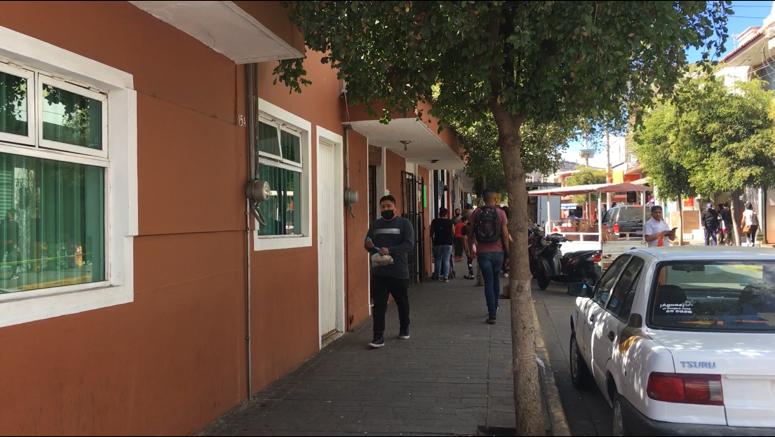
According to those affected, sales decreased by up to 85 percent during the first week. Photo: Héctor Ruiz.
Even though the new stalls designed for the merchants, which cost 7,500 pesos each, will not be charged to them, the vendors are looking for at least a support plan from the City Hall to ease them through this first phase of the change. However, such support has not been confirmed, which is why some of the vendors have been reluctant to move to the new space. The elevator installed after the remodel is not working, exacerbating the problem.
Some merchants opted to stop selling in the area, such as those who preferred to set up their vending stall outside their house on 499 Morelos Street in Nextipac, because their advanced age made climbing the stairs every day with their merchandise an impossible task.
The stairs have led to complaints from other merchants. Several told Laguna that «it has caused us more work to climb every day with all the product, it is very heavy».
The merchants who could not find a place inside the Market were hit even harder. They were relocated to the small square of «La Campana», a junction of Morelos and Independencia streets, which resulted in very low sales.
«Not even the flies can stop there», complained the vendors, who said that they will try to endure the situation as best they can in the hope that, with the passage of time and the force of habit, their former customers will come to their new facilities.
Meanwhile, since the relocation, the Government of Jocotepec began adding new signage to help rehabilitate Jocotepec’s urban image, damaged recently by the piles of garbage accumulated by the irregular collection service .
Translated by Patrick O’Heffernan
Por lesiones dolosas y violencia familiar lo detienen en Jocotepec
Camioneta de la Fiscalía. Foto: Ilustrativa.
Redacción. – Por su probable participación en los delitos de violencia familiar y lesiones dolosas, José Luis R fue detenido en Jocotepec, por elementos de la Fiscalía Regional.
De acuerdo con la información de los hechos, el 14 de febrero del 2020, José Luis R. agredió a su pareja sentimental y la acusó de haberle robado dinero. Al tratar de intervenir, los hijos también fueron agredidos al igual que una hermana de la víctima quien fue amenazada con un machete.
Para hacer efectiva la justicia las víctimas, el agente del Ministerio Público realizó indagatorias con perspectiva de género y acreditó mediante datos de prueba, la probable responsabilidad de dicho sujeto en la comisión de los delitos de violencia familiar y lesiones dolosas, por lo que solicitó una orden de aprehensión en su contra.
© 2016. Todos los derechos reservados. Semanario de la Ribera de Chapala
